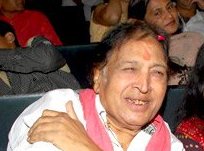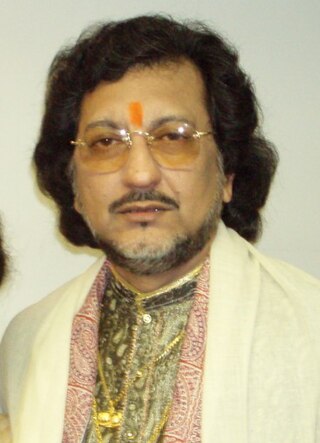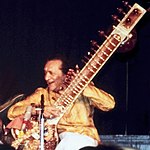
Ustad Sultan Khan was an Indian sarangi player and classical vocalist belonging to Sikar Gharana. He was one of the founding members of the Indian fusion group Tabla Beat Science, with Zakir Hussain and Bill Laswell. He was awarded the Padma Bhushan, India's third highest civilian honour, in 2010.

Shujaat Husain Khan is one of the most acclaimed North Indian musicians and sitar players of his generation.
Pandit Budhaditya Mukherjee is an Indian classical sitar and surbahar maestro of the Imdadkhani gharana (school), recognizable by his intricate vocalic playing complemented by spectacular high speed playing. He holds a unique distinction of being the ever first artist in history to perform in the House of Commons, London. Famously proclaimed the "sitar artist of the century" by veena great Balachander, he has performed in thousands of concerts since the 1970s in India, America, Australia, the UAE, and almost all of Europe.
Ustad Faiyaz Khan was a tabla player of international repute.

Pandit Swapan Chaudhuri, is an Indian tabla player. He has accompanied several musicians of Indian classical music, including, Pandit Ravi Shankar, Ustad Ali Akbar Khan, Ustad Vilayat Khan, Pandit Bhimsen Joshi, Pandit Jasraj, Ustad Amjad Ali Khan, Ken Zuckerman and many more. He also taught his sons tabla. Chaudhuri is a disciple of Santosh Biswas in the Lucknow gharana.
Ustad Ahmed Jan Khan "Thirakwa" was an Indian tabla player, commonly considered the pre-eminent soloist among tabla players of the 20th century, and among the most influential percussionists in the history of Indian Classical Music.
The Lucknow Gharānā, also known as "Purab Gharâna" for tabla, is a discipleship tradition ("gharana") with a tabla legacy and Kathak legacy. These two traditions are known for being one of the six major gharanas of tabla and three gharanas of kathak.

Pandit Kumar Bose, born 4 April 1953, is an Indian tabla musician and composer of Indian classical music.

Pandit Motiram Pandit Maniram Sangeet Samaroh is an annual Indian classical music festival held at Chowmahalla Palace in Hyderabad, India. The festival is organised by noted classical singer Pt. Jasraj in memory of his father and brother, both classical musicians. Jasraj always performs on 30 November every year, his father's death anniversary and a tribute to Jasraj's guru, his mentor and elder brother, Maniram, who died in 1986, and Jasraj renamed the festival to include his brother's name.

Pandit Nayan Ghosh is an Indian tabla and sitar maestro. He is a tabla player from the Farrukhabad Gharana.
Farrukhabad Gharana is one of six prominent playing styles or gharanas of North Indian tabla, in Hindustani classical music, and derives its name from Farrukhabad in Uttar Pradesh.
Pandit Shankar Ghosh was an Indian Tabla player from the Farukhabad gharana of Hindustani classical music. He has revolutionized both the art of Tabla solo playing as well as Tabla accompaniment. His many compositions have become an intrinsic part of the contemporary Tabla repertoire.

Pandit Anindo Chatterjee is an Indian tabla player of the Farrukhabad gharana school. He was born into a musical family. Chatterjee is a disciple of Pandit Jnan Prakash Ghosh.

Abdul Sattar Khan, popularly known as Ustad Tari Khan, is a Pakistani tabla player and vocalist.

Amit Kavthekar is an Indian tabla player known as the last ganda-bandhan of Utd. Allarakha Khansaheb and a prominent disciple of Utd. Zakir Hussain. Kavthekar is regarded as one of the leading young artists of Indian Classical music and tabla.
Mehmood Dhaulpuri was an Indian musician of Hindustani music, known as a leading exponent of Harmonium, an Indian variant of the Pump organ. He was an accompanist to renowned Hindustani vocalists such as Parveen Sultana, Bhimsen Joshi, Jasraj, Girija Devi, Kishori Amonkar and Ustad Ghulam Sadiq Khan. The Government of India awarded him the fourth highest civilian honour of the Padma Shri, in 2006, for his contributions to Music, making him the first harmonium player to receive the award.
Pandit Nikhil Jyoti Ghosh was an Indian musician, teacher and writer, known for his proficiency in the percussion instrument of tabla.
Ustad Faiyaz Khan is an Indian vocalist, Sarangi artiste and a tabla player who sings Hindustani music. He is well known for rendering Khyal music & sarangi solos and also well known for Kannada Dasar pada & vachanas
Ishaan Ghosh is the son and disciple of the Tabla and Sitar maestro Pandit Nayan Ghosh. Ishaan is a Tabla player from the Farrukhabad Gharana.

Subhankar Banerjee was an Indian musician and tabla player of the Farukhabad tradition.















